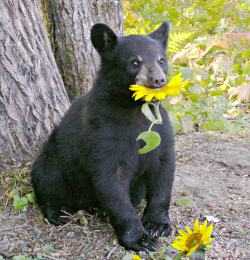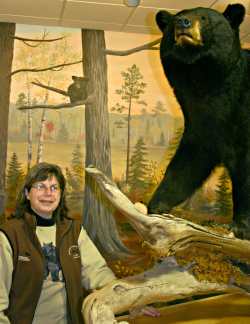Ely and the three bears
At the North American Bear Center, visitors meet some big personalities.

© Photo by Donna Phelan
Everyone loves a teddy bear, especially one called Ted.
He was one of the world's largest black bears, at 850 pounds, but he didn't throw his weight around.
When a fellow bear didn't want to play, he merely whined, "like a foghorn," says curator Donna Phelan. And when he wanted to make friends, which was all the time, he made a "wonderful amiable sound, an umph-umph-umph."
For many years, Ted was a gentle and jovial ambassador for the North American Bear Center in Ely. He died at age 25 in 2022.
The center opened in May 2007 with 40 exhibits plus Ted and a bear named Honey, who lived on 2½ forested acres with a pond and waterfalls. A young cub named Lucky arrived that summer and later was joined by the yearling cubs Holly in 2013 and Tasha in 2016.
The exhibits are based on the research of Dr. Lynn Rogers, whose work with bears around Ely is world-famous.
They're fascinating — but then, so are the bears, which have personalities as large as their furry frames.
"Lucky is mischievous and engaging, with a sparkle in his eyes, as if there's a whole new world out there,'' Phelan said.
"He's one of the happiest go-lucky cubs; he's a ham like Ted. He'll look right in the viewing window, and all the kids will giggle."
Lucky had less luck with the late Honey, who tended to be moody, reserved and easily irritated. After Lucky arrived, she chased him up a tree whenever he got too close.
"It's all about personalities, with bears," said Phelan.
The bears were hibernating when we visited the center in February, but we got to see videos of them on some of the 35 screens showing footage of bears in the wild.
In the theater, we watched a video of Lynn Rogers working with his research bears, including Whiteheart, a wild bear who became so trusting she twice allowed him to slip a radio collar around her neck.
The mission of the center's staff is to educate the public about bears, especially the black bears that live around the Great Lakes.
"We've taken this gentle, timid animal whose life is ruled by fear and created a Halloween monster," Rogers says in the video about him, "The Man Who Walks With Bears."
Another video shows Hollywood trainer Ruth La Barge coaxing a snarl from a bear named Bonkers, whom she has trained to look dangerous in return for a treat. He offers a half-hearted snarl, then tries again.

© Beth Gauper
"Oh, you're so good, show me you're serious," she says, cooing. "Oh, good boy."
Next to that are dozens of magazine covers of gentle Bonkers, with the headlines "Terror!" and "Attacked!"
Bears do act threatening when they feel threatened, huffing and bluff-charging at intruders. It's part of their language, which Rogers has learned over the years, though even he is occasionally bloodied by a swipe from an irritated bear.
"It's taken me years to read their faces and the way they breathe, and sometimes I make a mistake," he says.
"When you see a bear in the woods, it's not a cause for panic; it's something we can enjoy. But it took me more than 20 years to overcome my fear, way longer than it should have."
It's a message people like to hear.
"People are like, 'Boy, we'll really enjoy camping now,' " Phelan said. "The cabin people are coming here, and it's helping them understand. We have cougars breeding up by the Echo Trail (just north of Ely), and we're not cougar-educated, so suddenly, the bears look really mild."
Through a large viewing window, visitors can watch the bears swimming in the pond, chasing squirrels and foraging for food.
The staff hides food amid clover, in trees and under rocks, making the bears work for it, and they also stick food in logs for the bears to rip up.
Visitors are invited to bring bags of Juneberries and wild blueberries for the bears, who will disseminate the seeds in their scat and eventually have berries of their own to eat.
In fall, the bears welcome visitors bearing acorns and, especially, wild hazelnuts.
The center tries to give the bears a better diet than they had in captivity. Ted, born in 1997, was raised in Wisconsin, where his diet included bags of candy.
Lucky was taken from his den in 2007 by people who planned to keep him as a pet. When he proved to be a handful, the Wisconsin DNR said he couldn't be released into the wild, and he would have been killed if he hadn't found a home at the North American Bear Center.
Holly was only 2 months old when she was separated from her mother by a forest fire in Arkansas. A man found her and took her in, and by the time wildlife officials met her, she already was habituated to humans and could not be released back into the wild.
She likely has Minnesota roots, Rogers says, because Arkansas reestablished its bear population with bears from Minnesota.
Tasha's mother was killed by a truck in Kentucky. A man found her and cared for her until she was sent to Minnesota.
The bears will continue to educate researchers at the bear center and at Rogers' Wildlife Research Institute.
"We learn something every day," Phelan said. "That's how intricate their lives are, that's how smart their lives are and that's how much more we need to learn."
Trip Tips: North American Bear Center in Ely
Getting there: It's on Minnesota 169, on the west edge of Ely in northern Minnesota.
Hours: The center is open daily from May through late October and the week between Christmas and New Year's.
It's open Fridays and Saturdays from late October through Thanksgiving and in spring.
When to go: The bears take naps in early afternoon. Watch for special programs on summer weekends. There's also a nature trail for visitors to walk.
Admission: It's $15, $9 for children 3-12.
Information: North American Bear Center, 218-365-7879 or 877-365-7879.
For more about winter in Ely, see Winter in Ely. For summer fun, see Dreaming of Ely.
If you want to stay in Bear Head Lake State Park, where there's a guesthouse and camper cabins, see Ensconced in Ely.